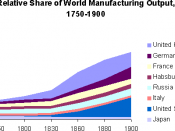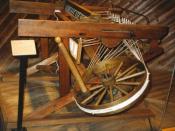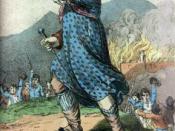In Europe, during the 1800's, a revolution in the way goods were produced occurred. No longer did the craftsman make things with his own two hands, but machines that could produce things astronomically faster, cheaper, and more efficient took their place. With this revolution many good things as well as many bad things resulted.
The first product to be completely industrialized in Great Britain was textiles. When machines and factories were introduced, weavers who had based their whole lives on the art of weaving and producing textiles suddenly were left jobless. "Many such unemployed workers, weavers and others, turned their animosity towards the machines that had taken their jobs and began destroying factories and machinery. These attackers became known as Luddites, supposedly followers of Ned Ludd, a folklore figure" (Wikipedia.com). This vigilantly group was formed in 1811. As the Luddites began to gain in popularity the British government took action.
In February 1812 the government of Spencer Perceval proposed that machine-breaking should become a capital offence. Despite a passionate speech by Lord Byron in the House of Lords, Parliament passed the Frame Breaking Act that enabled people convicted of machine-breaking to be sentenced to death. As a further precaution, the government ordered 12,000 troops into the areas where the Luddites were active. After several years of violence and executions, by 1817 the Luddite movement ceased to exist. (The Luddites)
Another negative outcome was the unfairness of the working conditions and wages in the factories. Many employers chose to hire women over men; this was only because they paid women much less. Two dollars an hour less than the average pay of a man working the same job. Not only were women treated unfairly, but children worked for even less and were forced to work long hard days. Lower class children...


